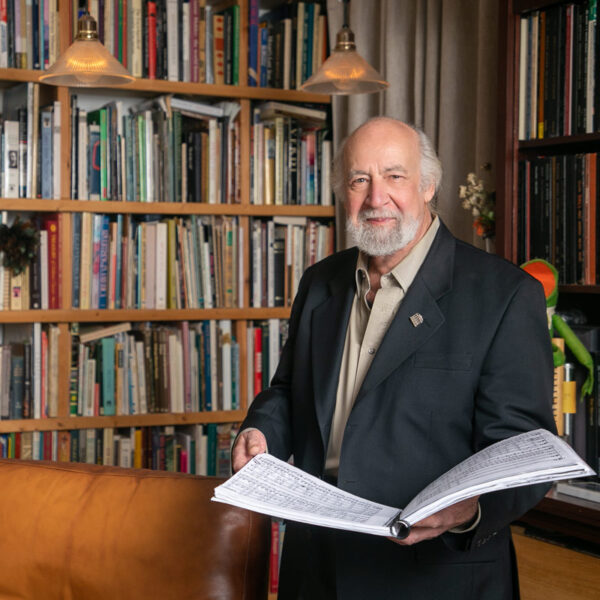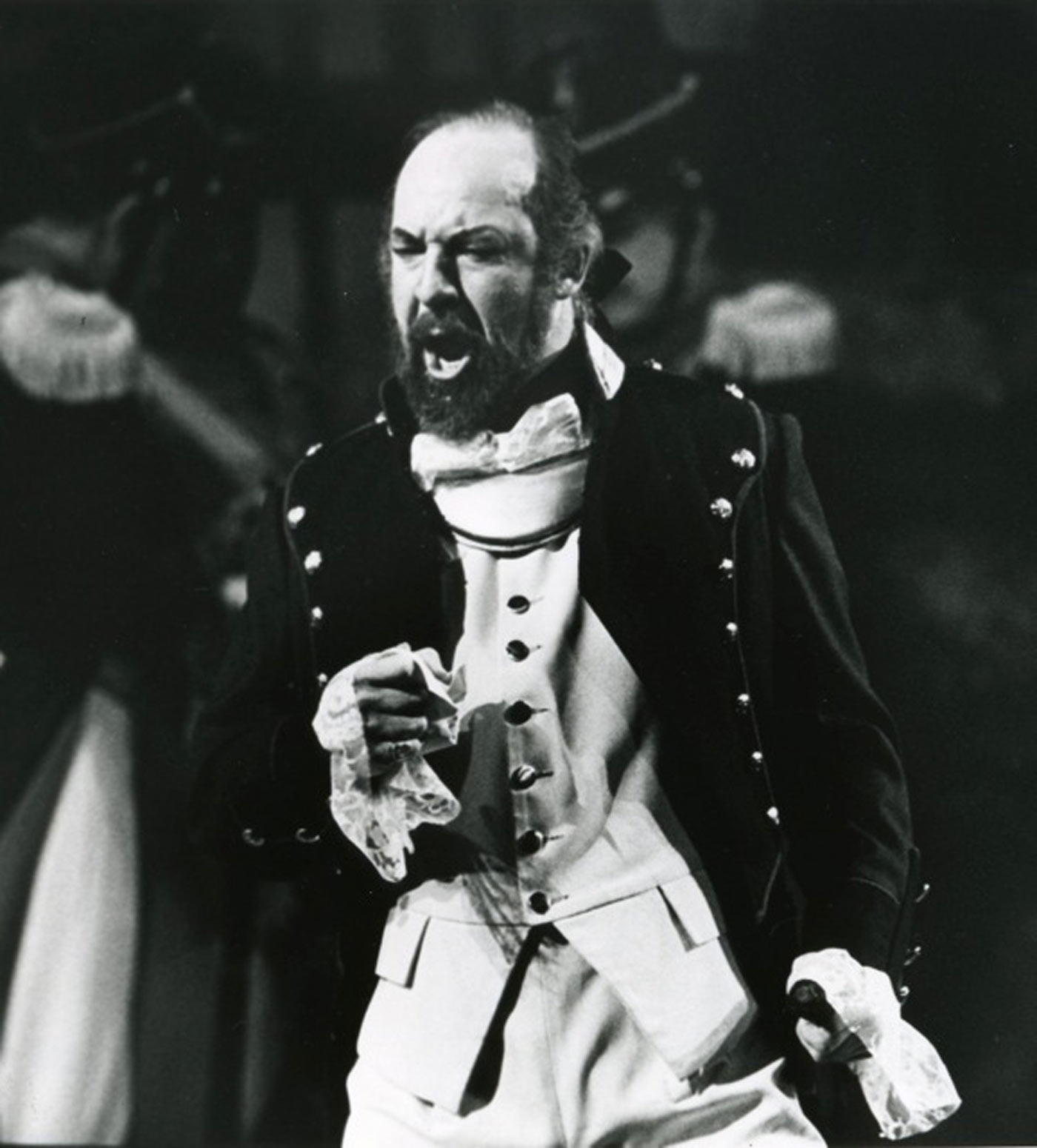SINGING VOLUMES
By Bill McLean
PHOTOGRAPHY BY MARIA PONCE BERRE
STYLING BY THERESA DEMARIA
Powers, a renowned opera singer and vocal teacher.
By Bill McLean
PHOTOGRAPHY BY MARIA PONCE BERRE
STYLING BY THERESA DEMARIA
Powers, a renowned opera singer and vocal teacher.

Make major operatic artist Bill Powers laugh inside a building and you’d risk the collapse of a few walls. Powers’ voice is that thunderous, that deep, and that impactful. When Powers starred as Mephistopheles in the opera Faust, the conductor told him, “You have the power to terrify.”
A contest pitting Powers’ bass-baritone guffaw vs. Vincent Price’s evil laugh wouldn’t last a round with Powers’ pipes winning by resounding knockout.
The 82-year-old Lake Barrington resident describes the elite forces in international opera as “vocal Olympic athletes.” And after performing more than 130 leading and supporting roles—mostly and fittingly as either a villain or rogue—in six languages in hundreds of national and international productions, Powers should know.
Yet, Powers is a true multi-hyphenate—pursuing careers not only in opera but also in teaching and illustrating. The man, who made his New York City Opera debut (Mozart’s Don Giovanni) in 1972, performed in August 2023 with La Grange’s Salt Creek Orchestra at its opera in concert, Don Pasquale. His 2021 album, Songs and Dances of Death, will be aired by 98.7 WFMT host Peter van de Graaff in February. His 17-second commute as a voice teacher/role preparation guru/vocal coach requires climbing a staircase from the living quarters of his house (a converted 19th-century Lake Barrington schoolhouse) to the first floor, aka the Williams Powers Voice Studio. Like his vocal cords, Powers’ hands are creative tools. He uses them to craft Halloween greeting cards and produce drawings of local houses.
These successful pursuits were the result of a failed career on the gridiron. “My dream was to become a professional football player,” says Powers, whose dream died after sitting on the Illinois Wesleyan University’s (IWU) football bench quarter after quarter after quarter during his freshman year. “I had a natural ability to sing, so I turned to that. I had a good ear, but I couldn’t play an instrument and I couldn’t read music.”
Powers grew up in Bensenville, Illinois, and attended Fenton High School, where he played football, wrestled, and ran track. After hearing the mesmerizing voice of tenor/actor Mario Lanza, he became interested in singing and joined the high school chorus. As a high school sophomore and junior, Powers won a state music title in the Boys Low Voice category.
At IWU, he became a BMOC (Best Musician On Campus) and graduated in June 1964. A few days later, he found himself warbling at the Chicago restaurant Matt Igler’s Casino, “Home of the Singing Waiters.” Powers made $7.50 a night, not an hour, and not including tips.
“I made more money than my dad did,” he says.
Inhaled more cigarette smoke, too. Most folks back then enjoyed a side of ciggies with their main course. When a voice teacher advised Powers to escape the smoke-filled workspace to safeguard his lungs and vocal cords, Powers left Igler’s after an 18-month stint.
At age 27, he enlisted in the U.S. Army where a Military Occupational Specialty allowed him to perform in the bass section of the U.S. Army Band and Chorus in Washington, D.C.
“The Army has a place for a singer. Did you know that?” Powers says. “I got to entertain three U.S. presidents, U.S. senators and representatives, and political heads and other dignitaries from all over the world,” Powers says.
After his military career ended, Powers began auditioning for operatic roles. In 1973, he’d been 0-for-9 in New York City Opera auditions when he noticed renowned operatic bass-baritone Norman Treigle and his wife eating dinner together at an NYC restaurant.

Seeing Treigle, who sang with the New York City Opera for over 20 years and was described by the New York Times as having “one of the finest bass voices of his generation,” was a powerful moment for Powers.
“I had to say something to Norman, even if it meant interrupting the couple’s meal,” Powers recalls. “I said, ‘I’m sorry, Mr. Treigle. I just wanted you to know that I’m a bass-baritone and I’m absolutely in love with your singing voice and your work. You’re my guiding light.’”
Powers was in mid-turn when he heard, “Stay. Have steak with us.”
It was Treigle’s voice.
Powers stayed and became an understudy to Treigle soon thereafter. They were “inseparable for two years,” Powers recalls.
Treigle died at age 47 in 1975.
Concert and operatic bass-baritone George London then emerged as the second major mentor in Powers’ career. Voice coach John Bullock—the late father of actor Sandra Bullock—eventually entered the picture and told Powers, “You need to change your way of singing.”
“John Bullock,” Powers recounts, “claimed my technique had reached a dead end. I asked him, ‘Can you fix me in six months?’ He worked with me and told me I’d probably lose my voice along the way. John was a force of nature, an extraordinary voice coach. My first session with him—scary.”
“So few people make it big in opera,” he adds. “I’ve been incredibly fortunate, having run into all these wonderful, important people who helped me in my career.”
But luck had nothing to do with Powers landing gigantic operatic gigs. His resume boasts iconic roles like Scarpia, Iago, Pizarro, Miracle, Mefisto, Falstaff, Alberich, Celio, Philip, Sarastro, Fiesco, and Death. He also portrayed John the Baptist in Salome and Meyer Wolfsheim in John Harbison’s The Great Gatsby.
Now, he uses those years of experience to transform the voices of a new generation of singers. Powers proudly recalls how he helped a 13-year-old student prepare for a fast-approaching school contest. After welcoming the girl and her mother to his studio, the girl performed her piece but the student’s cheery rendition of the tune concerned Powers.
“I said to her, ‘You know, the song you just performed is a sad song,’” Powers says.
The octogenarian then encouraged the teen to sing it again, right then and there, this time while thinking of something terribly sad. The kid nailed it.
“Beautiful. She sang it beautifully,” Powers remembers. “I asked her, ‘What helped you sing it that way?’ She replied, ‘Thinking about my dying hamster.’”
The student won the contest—just another shining moment in Powers’ multi-faceted and fascinating career.
For more information about Bill Powers and his offerings as an instructor, visit barringtonvoicelessons.com. The website also provides contact information for those interested in Powers’ house illustrations.
Sign Up for the JWC Media Email